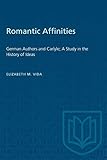Romantic Affinities : German Authors and Carlyle; A Study in the History of Ideas / Elizabeth M. Vida.
Material type: TextSeries: HeritagePublisher: Toronto : University of Toronto Press, [1993]Copyright date: ©1993Description: 1 online resource (280 p.)Content type:
TextSeries: HeritagePublisher: Toronto : University of Toronto Press, [1993]Copyright date: ©1993Description: 1 online resource (280 p.)Content type: - 9781487573270
- 9781487584474
- 824/.8 20
- online - DeGruyter
| Item type | Current library | Call number | URL | Status | Notes | Barcode | |
|---|---|---|---|---|---|---|---|
 eBook
eBook
|
Biblioteca "Angelicum" Pont. Univ. S.Tommaso d'Aquino Nuvola online | online - DeGruyter (Browse shelf(Opens below)) | Online access | Not for loan (Accesso limitato) | Accesso per gli utenti autorizzati / Access for authorized users | (dgr)9781487584474 |
Browsing Biblioteca "Angelicum" Pont. Univ. S.Tommaso d'Aquino shelves, Shelving location: Nuvola online Close shelf browser (Hides shelf browser)

|

|

|

|

|

|

|
||
| online - DeGruyter Proceedings of the Fifth Canadian Mathematical Congress : University of Montreal, 1961 / | online - DeGruyter Canadian Anti-Combines Administration 1952-1960 / | online - DeGruyter Taras Shevchenko : A Life / | online - DeGruyter Romantic Affinities : German Authors and Carlyle; A Study in the History of Ideas / | online - DeGruyter The Evolution of International Trade Agreements / | online - DeGruyter Toronto During the French Regime : A History of the Toronto Region From Brule to Simcoe, 1615-1793 / | online - DeGruyter The Life and Times of Confederation 1864-1867 : Politics, Newspapers, and the Union of British North America / |
restricted access online access with authorization star
http://purl.org/coar/access_right/c_16ec
'And how he studied us Germans! He is almost more at home in our literature than we are ourselves.' (Eckermann, Coversations, 11 October 1892, as "ed in Romantic Affinities, p. 298). Carlyle saw German Romanticism as a continuation of Goethe's efforts to oppose the rationalistic tendencies of the Enlightenment. the fusion of philosophy and poetry in German literature and its novelty in concept and form attracted Carlyle and became central to his emblematic vision. In Romantic Affinities E.M. Vida re-evaluates the contribution of German literature and philosophy to Carlyle's early literary work. She examines Essays, German Romance, Sartor Riartus, Heroes, and Past and Present, and traces in these works of the influence of a wide range of authors, from Goethe, Jean Paul [Friedrich Richter], and Novalis, to Ludwig Tieck, E.T.A. Hoffmann, Fichte, Fouqué, Wilhelm Hauff, and the critic Friedrich Schlegel. Influences in works of German literature which Carlyle actually read, or may be presumed to have known on the basis of internal evidence, include a German philosophy of clothes, eccentric originals and their editors, German spiritual biographies, renunciation as a way of life, the notion of Palingenesia or rebirth of society, and additional references to the 'Everlasting No and Yea.' Vida reveals how Carlyle combined and reshaped these heterogeneous influences to suit his own artistic and literary ends.
Mode of access: Internet via World Wide Web.
In English.
Description based on online resource; title from PDF title page (publisher's Web site, viewed 01. Nov 2023)


